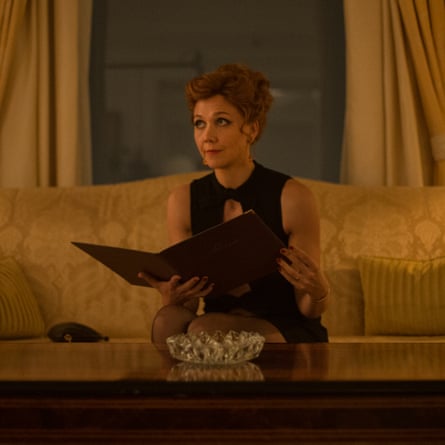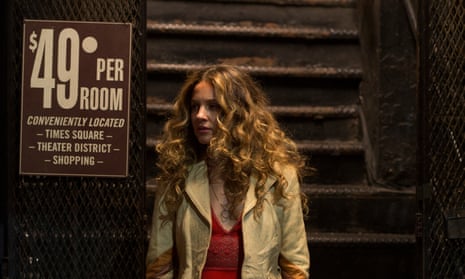Spoiler alert: this recap is for people watching The Deuce on Sky Atlantic in the UK. Please do not add spoilers from later episodes.
Won’t somebody think of the pimps? A Mafia masterplan to bring illegal sexual activities off the Deuce and on to the screen has cut out the middle man. All of a sudden those primped and preened individuals, the men who fund a lifestyle of canes and fur-lined coats through the subjugation and sexual exploitation of women, are vulnerable.
This new state of affairs has led to consternation, confusion and, in the case of Reggie Love, execution. When the diminutive pimp threatens one of his girls in the 42nd Street diner, lanky waiter Leon shoots him dead. He kills Reggie with a single bullet, then informs the police as if reporting a cat stuck in a tree. The young woman, already frightened, is hardly consoled. She gets up and runs for the street.
Reggie wasn’t a loveable character; far from it. He abused his girls constantly. He was demeaning to both Sandra and Abby too when he met them. He was violent and angry and lazy and pompous and looked a fool in his get-up. But yet there was also something pathetic about him; a little man scrabbling around on the street trying to make himself look big. And in that sense, Reggie Love embodies all of the pimps.
Rodney has his wise-cracks, CC has his groomed style, Larry has his masculine charisma. But any power they had on the street came simply from physical dominance; both over their women and the johns who might seek to hurt them. These men have no equity, no stake in the sex industry and their control has been taken away from them almost overnight. It’s not easy to feel sorry for them, but they are losers in the game.
That’s not an easy idea to swallow, I know, and in a way I think it’s a provocation on the part of David Simon, George Pelecanos and the writer of this week’s episode Megan Abbott (one directed, by the way, by James Franco). It seems deliberate to me because while the men who dominated the early exchanges of the series find themselves emasculated, the women (at least some of them) are beginning to assert their independence.
The leader of the rebellion is the unlikely figure of Ashley. One of CC’s girls, she has so far been a tragic character, sliced under the armpits for not working hard enough, replaced in her pimp’s affections by the newcomer Lori. Furthermore, she is booted from CC’s car in this week’s opening scene and told to go to work in the parlour while he and Lori head for the porn set. But instead of going inside and enjoying “another day, another bunch of dicks”, she walks off down the street alone.
Later we learn that Ashley has opted for the Hi-Hat, where she meets Frankie. Together they attend the premiere of some gay erotica. She then goes on to spend the night with Frankie in a hotel, a night during which no money changes hands.

From there Ashley is passed to the care of Abby, who takes her into her apartment. Abby doesn’t trust her at first, but soon finds that her house guest is not only conscientious (she cleans the flat, something that’s below Abby) but curious too, always reading books and asking questions. By the end of the episode, Ashley has left New York and CC altogether, heading to Buffalo with a cheque from Abby’s dad in her bag. The final shot sees her looking, beyond the camera once again, as she heads for the chance of a new start.
As for Abby, well, I’ve not been a fan to this point but I have to tip my hat to her here. Her trip to the family home in Connecticut seemed entirely designed to irritate her father (which, given the weight the phrase “daddy issues” carries in this drama, might in itself give pause for thought). The cheque that comes out of it, however, is passed to Ashley with no strings attached. When Abby bought Darlene a bus ticket home, it seemed a little patronising – “Here I am freeing you from this horrible life”. It was a gesture that was also confounded when Darlene used the money to bring back more girls for Larry. On this occasion, however, there was none of the didacticism and perhaps Abby has learned from her experience.
So that’s Ashley and Abby asserting themselves. Lori, too, is using the power of celluloid to boost her self-esteem, pointing out to all the lads in the sex shop that she is the star of their skin flicks. Meanwhile, Candy/Eileen seems finally set to get behind the camera where she wants to be and – given her direction of Lori and her adjustment of the decor in the French maids romp – where she deserves to be too. We know from current eventsin the real world that systemic injustice experienced by women will last way beyond the timeframe of this drama – but still, it’s good to see a shift in the balance of power in the show if only for a moment.
Notes and queries
- Ever since spotting the Karate Kid on IMDB’s credits I have been waiting for him to appear, so was that Ralph Macchio saying “au reservoir”?
- The class clown, the resident loudmouth, the ego with a handlebar moustache … but this week we learned that Frankie Martino is also homeless.
- “There’s a $100,000 porn film about a girl with a clit in her throat” – that’s Paul’s actor friend talking about … Deep Throat?
- While we are on the subject of Paul’s pal, a moment to applaud the success of The Boys in the Sand, the first piece of gay erotica to screen with credits, which did indeed get a positive review in Variety and made a lot of money to boot (I also note that it inspired the abiding trend for porn films to pun on pre-exisitng titles by riffing on The Boys in the Band). Question, though: can anyone explain how, when Paul was arrested for soliciting the other week (and, as far as I can see, homosexual acts were illegal in New York until 1980), this film could be publicly released without the audience also getting nicked?
- Kudos to Rodney and CC for their enjoyment of Fantasia; the Sorcerer’s Apprentice passage remains an all-time classic.

Comments (…)
Sign in or create your Guardian account to join the discussion